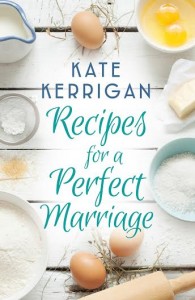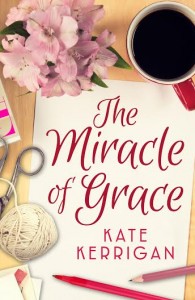Kate Kerrigan is the author of Ellis Island, City of Hope, and Land of Dreams — a series of books I loved! She has two new books coming out The Miracle of Grace and Recipes for a Perfect Marriage. Please give her a warm welcome today.
Grace’s mother Eileen is a great list maker, so when Grace walks into Eileen’s kitchen to drop off a postal package and sees her garish ‘To Do’ pad on the counter, she thinks nothing of it, until she sneaks a look. There, at No 8, ranked in importance well below bread, telephone bill and bins is ‘Tell G I have ovarian cancer, probably terminal’. Grace goes into shock, primarily at the thought that her mother is dying, but also at the fact that her mother simply couldn’t tell her to her face. Is their relationship really so bad?
Eileen has been brought up in rural Ireland in the 1950s, in thrall to the rules of her community – church first, then husband, then children. So she’s had little time for herself and even now finds it impossible to put her own problems and desires to the fore. It is only when Grace confronts her, that she is able to go back over her past, to her own childhood, her early marriage, and the birth of her cherished only daughter to find memories of happiness and unbearable tragedy that have coloured her life forever.

Successful New York food writer Tressa Nolan has a great life — wonderful friends, a gorgeous apartment, and of course fabulous food — but the idea of turning forty alone scares her, so she marries the next man who asks: Dan, her building’s super. He’s handsome and he adores her, but soon after the wedding Tressa regrets her decision. Everything from Dan’s unsophisticated interests to his enormous (and intrusive) Irish-American family sets her teeth on edge. Why couldn’t she have the perfect marriage her grandparents had? What Tressa doesn’t know — what she only discovers when she reads her Grandma Bernadine’s journal-cum- recipe book — is that she’s following in Bernadine’s footsteps, and like all the best recipes, a perfect marriage calls for a long, slow simmer.
How do you come up with your ideas? Are they character or concept driven?
A bit of both. The concept comes first – but then once the characters present themselves and start to develop depth as they do in those early chapters, the story becomes theirs and they drive the narrative absolutely.
You often have dual timelines. Why is that? What is it about historical fiction that interests you so much?
I am fascinated by how the differences in our historical circumstances shape who we are and how we behave — especially in the way it affects our emotional landscapes. Stoicism, for instance, has gone way out of fashion as a way of being — yet it was a way of life for so many women, for so long — forced into unhappy marriages by religion for or utterly financially dependent on men they did not love. Yet — so much of what was good about value systems in the past: loyalty, a strong sense of identity, and place — still hold true today. I love drawing comparisons between how things were and how they are now and showing how while history may alter our circumstances, in the most real, important sense human beings never fundamentally change.
For all the freedom and money history has given us women in the western world — are we any happier now than our grandmothers were?
What’s your favorite part of the writing process?
Starting and finishing: one week at either end. Finishing is best. Honestly? The rest is pretty much just hard work: I write out of a compulsion to tell the story not because I enjoy the act of writing itself. The longer I do it – the less I feel I know about writing and the harder it gets! I get very close to my characters and I cry a lot. It’s an emotional rollercoaster — and I am always a bit sad to get off at the end — but relieved too.
Describe a typical day as a writer.
On a good day, I go into my accountants office, work from 9-5 and get 1,500 words written — this is what I intend every working day to be. However most days, I go into my accountants office, work from 9-5 and get 500 words written and know it’s not enough. On a bad day I get distracted by life. I chase around shopping, collecting kids, doing hideous admin., having lunch with my mother – I get nothing written and get whipped up into a state of blind panic at not having written anything. I have a lot of bad days.
Which authors inspire you?
People who write from the heart: Marian Keyes, Patrick McCabe – a lesser known but brilliant Irish writer called Frank Ronan. Probably the biggest influences over my lifetime as a reader and writer have been Agatha Christie for plot and PG Wodehouse for his vocabulary and use of language. I never read historical fiction — I don’t have the confidence! However — for pleasure and relaxation I rarely read anything other than contemporary thrillers — David Balducci is my current thrill!
Do you have any advice for aspiring authors?
Just write, write, write – don’t be discouraged and keep going. Writing is 1% talent and 99% hard work and tenacity. I found writing groups and courses fantastic in my pre-published days. It’s not always easy to motivate yourself and a good writing group can really give you the encouragement and support you need.
What do you hope readers will take away from your books?
Identification with the characters and at least one lesson they can relate to their own lives.
Thanks so much, Kate, for stopping by and sharing your thoughts on dual narratives, your favorite authors, and writing.





I’ve heard a lot about her work but have never tried it. I can’t believe she works all day at an accountant’s office and has the energy to write as well.
I really love her books.
Great interview! I loved the Ellis Island trilogy, and I really want to read her new books.
I want to read them too
Wonderful interview! I enjoyed reading about the writing process; writing well is hard work and requires a great deal of dedication. It is interesting that the author uses dual timelines in her work, and why she does so. Kate Kerrigan’s work sounds fascinating!
I really loved this interview.